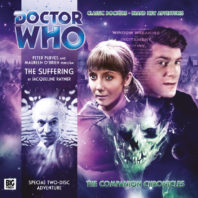
Released February 2010
Despite a simple premise regarding the format of The Companion Chronicles, there has already been a wealth of variability presented both in terms of framing devices and storytelling styles with characters both expected and not. With Jacqueline Rayner’s ‘The Suffering,’ the audio range ushers in a new era of possibilities as two companions take up narration and acting duties for the first time in the first four-part story to better approximate the traditional norms of classic series serials.
As the TARDIS arrives in 1912, the Doctor, Steven, and Vicki quickly find themselves immersed in a time of social change, both as the Suffragette movement lobbies for votes for women and as a search for the missing link to prove or disprove Darwin’s theories reaches a potentially pivotal moment. With both Peter Purves and Maureen O’Brien, the story very much unfolds in two distinct halves, and the chemistry the two have in their shared scenes aboard the TARDIS as they quite literally recall their own portions of the tale in front of a recording device brilliantly captures the sense of sibling friendliness and playfulness the two shared on screen. Indeed, as the two casually interrupt each other to interject an important thought or point while at other times begrudgingly remaining silent to allow another narrative thread to unwind, this is yet another successful example of how to effectively make the most of a story interspersed with narration.
Unfortunately, the two halves don’t mesh as well as might be expected and instead of telling one grand adventure instead feel incredibly distinct. This is not to say that either half succeeds or falls flat more than the other, but it does mean that the expanded running time afforded ‘The Suffering’ doesn’t necessarily get used to its full extent because there is quite a bit of filler and slower plot progression as a result. With Vicki out of the action for the majority of the first half, Steven recounts the story of the Doctor and him attempting to drive an automobile and then collect a series of disparate items that all link back to a very particular skull that is not the missing link expected but instead the physical remains of a vast alien intelligence determined to destroy the male gender. Given that the more serious ramifications of this finding are withheld until Vicki is properly entwined with a very forceful Suffragette beside her, this first half instead relies on comedy to fill its time, Steven’s attempts at carrying and then disposing of a bought skeleton an absolute highlight.
Although comedy and drama can blend spectacularly in the proper circumstances, all sense of levity is lost as the second half begins in earnest, but the plot and messaging lack the typical nuance of the range for it to truly resound. Using the alien’s own past to parallel the current state of gender affairs on Earth is a nice setup that allows innumerable storytelling opportunities, and Rayner brutally highlights the sexist attitudes and actions men took towards women at this time with Vicki right in the centre to ensure the audience is paying attention to every moment. However, once the true villain reveals herself, she is little more than a single-minded maniac who is far more imperfect and dangerous than any of the people protesting suffrage in London. This is a tale all about gender equality and the power of women, but whether a purposeful attempt to subvert expectations or not, this villain undermines much of what the plot strives to achieve and instead is used as a blunt instrument to hammer home the point that discrimination in any form is wrong.
‘The Suffering’ is, perhaps, a prime example of how thrusting an alien storyline into a period of genuine historical drama and interest takes away from the potential power of the plot. As a result, the two genuinely engaging elements at the heart of the plot deliver a lesser impact than should have been the case, leaving it up to the visuals and the immense charisma and power of Purves and O’Brien to elevate what becomes a fairly standard story in the end.
- Release Date: 2/2010


Leave a Reply